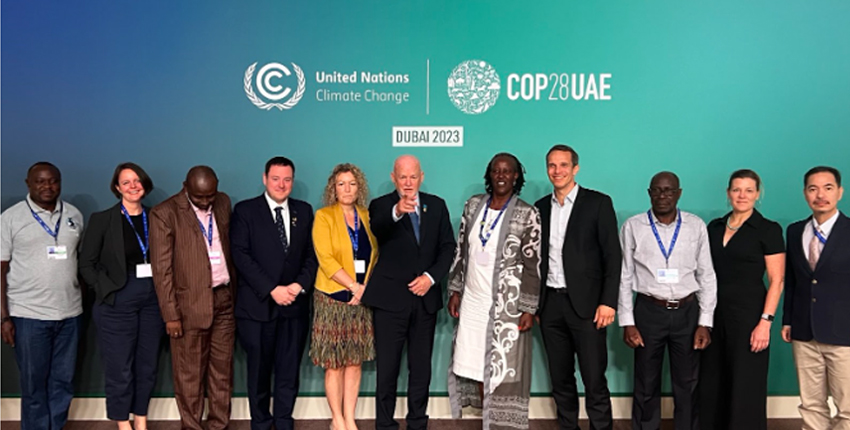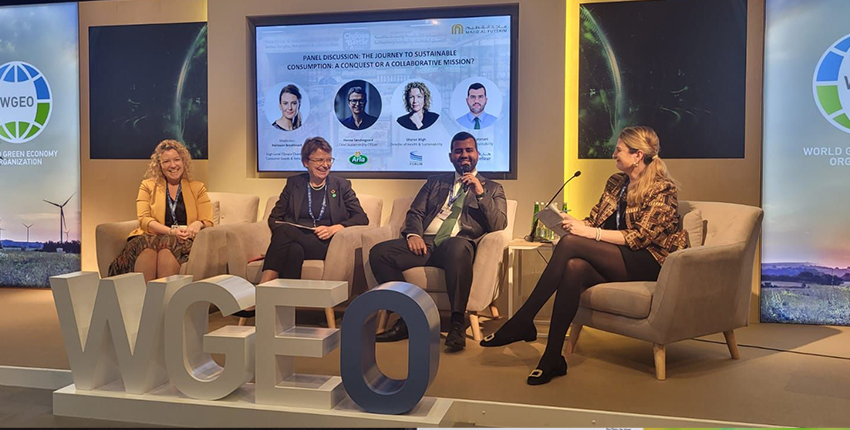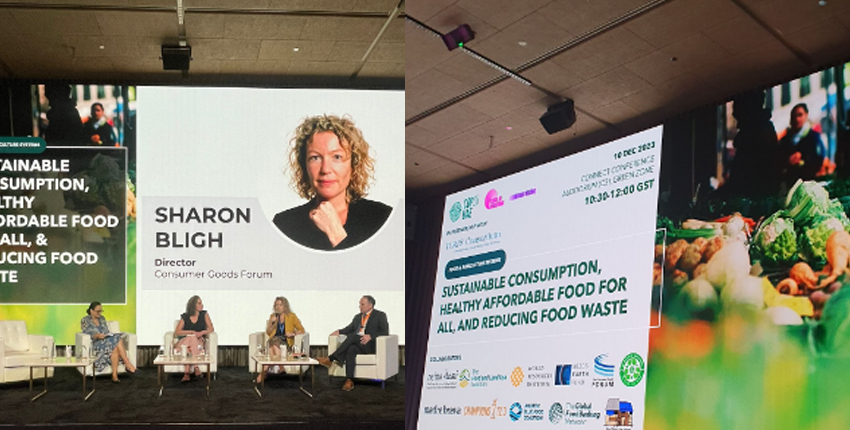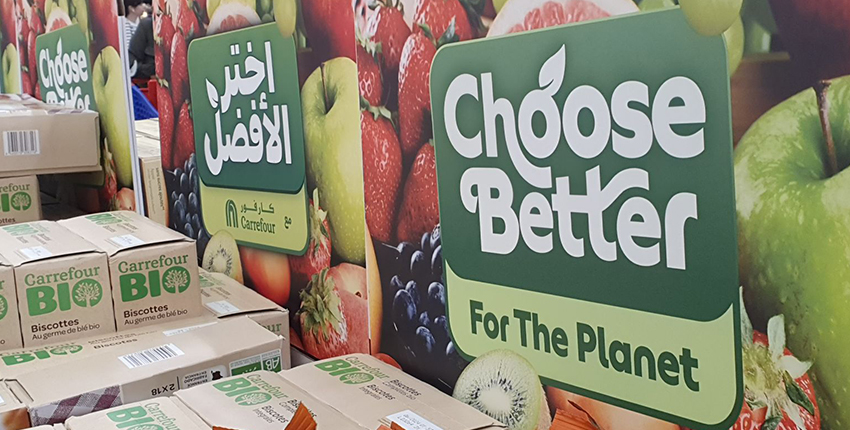Just short of 100,000 badges were issued for participants to attend the recent UN climate talks in Dubai, touted by many as a defining moment in our fight against climate change. Sharon Bligh, Director of Health & Sustainability at The Consumer Goods Forum was in attendance. From the 8th – 10th December, she joined various panels discussing sustainable consumption; tackling food waste; promoting health; and driving decarbonisation efforts.
On her return to the office, we caught up with her to get her impressions of the meeting.
Good to have you back Sharon! What are your main takeaways from COP28?
COP28 reinforced my understanding that change is both necessary, complex and urgent. To meet the internationally agreed climate goals, we simply cannot continue on our current trajectory. However, achieving the changes we need are both systemic and multilayered – we need to change our production and consumption patterns; change our relationship with fossil fuels so that we cut emissions, and make sufficient finance available to enable a transition away from carbon-based economies that is appropriate for communities around the world. At the same time, we must ensure that we build communities’ resilience and protect them from the worst impacts of climate change already being experienced.
To achieve this, we need to align the goals and aspirations of the Global North and the Global South. At an industry level, we need to rethink our supply chains and the way we produce and make available food. To this end, the inclusion of food on the COP agenda was a pivotal moment and a step in the right direction with 158 nations signing the Emirates Declaration on Sustainable Agriculture, Resilient Food Systems and Climate Action, for example.
These are all important in their own right, but more importantly, they are all interconnected. It is a mammoth challenge which we need to address with speed and scale as peoples’ lives and livelihoods in all corners of the world are at stake. More than ever, COP28 brought home that it is a challenge we can only overcome by working together.
How do you feel coming back from COP28?
Stubbornly optimistic! I know the process isn’t perfect, but it’s the one we have and I believe we have a duty to make it work. COP28 came at a crucial time, with the world having broken through the 2 degrees Celsius warming limit for the first time. There is a sense of urgency and while the process is indeed flawed, we must keep moving forward – we have no alternative.
Which panels did you speak on?
I took part in three panels focused on the role of food in solving the climate crises. On 10 December, I joined a panel in the Blue Zone (where the negotiations took place) on ‘Aquatic Food and Protein Transition‘. Moderated by Vincent Doumeizel, co-founder of the Global Seaweed Coalition and senior advisor to the United Nations Global Compact, this panel highlighted the importance of aquatic foods and alternative proteins in transforming food systems.
As part of our work with the Collaboration for Healthier Lives Coalition of Action I shared our recent work on consumer’s dietary shifts and its impact on our industry.

Later that day, also in the Blue Zone, I was joined by Arla Foods and CGF member Majid Al Futtaim (MAF) for a panel discussion titled, ‘The journey to sustainable consumption, a conquest or a collaborative mission?’. The panel, moderated by Doireann Breathnach, High Level Climate Champions Consumer Goods & Retail Lead, provided insights into the pivotal role of industry stakeholders in fostering a sustainable consumer goods industry. It was great catching up with Omar Katanani, Head of Sustainability and Samar Elmnhrawy, Chief HR Officer from MAF.
This coincides with the CGF’s Board of Directors mandate of bringing together consumer goods manufacturers and retailers in pursuit of business practices for efficiency and positive change across our industry. High-level collaboration and targeted local initiatives can prove to be a catalyst for change – driving global impact at scale.
The third session, titled ‘Sustainable Consumption, Healthy Affordable Food for All and Reducing Food Waste’ took place in the Green Zone and brought together a wide variety of stakeholders with CGF representing the private sector on healthy, sustainable and affordable food, and the reduction of food waste. This session really brought to light the need to include people in our planetary agenda as it’s often the most vulnerable populations that get left behind. I shared the data on food waste from the Food Waste Coalition’s first baseline report and the solutions we are working on to drive progress.
What were the key takeaways from these panels?
For me, everything boiled down to to three key points:
- Waste Management: We need to make a stronger business case to exceptionally manage and measure the waste produced in the food industry.
- Access to Healthier Options: Healthier and more sustainable alternatives, in-stores and through digital channels, need to be accessible, attractive and affordable.
- Collaboration: No solution will be long-lasting if sectors (finance, sustainability) and external stakeholders don’t work collectively.
You met up with Hani Weiss, CEO of Majid Al Futtaim and his Sustainability team, who launched Carrefour’s ‘Choose Better’ program at the COP 28 Pavilion and in their flagship stores in the U.A.E. Do you believe this is a step in the right direction?
It was really great to get to see the launch of the “Choose Better” programme, created by Carrefour and Majid Al Futtaim (MAF) in the UAE designed to aid customers to make healthier and more sustainable choices in-store. Their objective is aligned with the mission of our Collaboration for Healthier Lives Coalition of Action – where we bring retailers and manufacturers together to empower people to live healthier and more sustainable lives. It takes courage and leadership to take such bold action and collaborate successfully with suppliers to bring about this change. Carrefour and MAF have set a brilliant example of combining commitments to health, wellness and sustainability, for other companies to follow. I hope to see this scale to their stores in other markets bringing more consumers on the journey with us.
As The Consumer Goods Forum, how does this influence our mission moving forward?
We know what our industry has to do to drive positive climate action, and the takeaways from COP only serve to strengthen our resolve to keep moving forwards across all of our Coalitions. The business case for stopping food loss and waste is very clear, and it was very encouraging to see that it has been so high on the agenda at this year’s COP. Our Coalition will continue with its mission to halve per capita global food waste by 2030, accelerating action along the supply chain from the farm to the home. We have a clear vision on what needs to happen on health – there is a need for a dietary shift towards sustainable nutrition.
As we look forward to 2024, we will be mobilising our members on climate change as our work on decarbonisation takes shape, with the launch of our Net Zero Coalition of Action.



